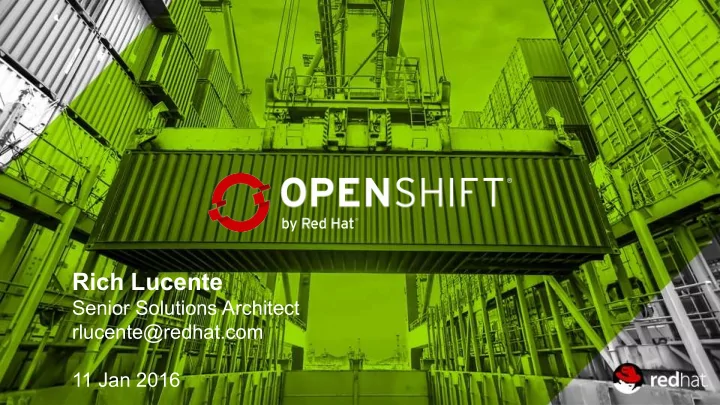

Rich Lucente Senior Solutions Architect rlucente@redhat.com 11 Jan 2016
Software Disrupts Business Retail Finance Media ? ? Transportation
STARTS WITH CONTAINERS Containers are just like the ISO shipping container that revolutionized the shipping industry Separation of concerns ● User cares about packing the inside – Shipper cares about moving the container – Standardized interface ● 5 OpenShift
CONTAINERS v VMs Traditional Virtualization What Defjnes Virtualization? V irtual hardware boundaries ● App A App B Hypervisor ● One OS instance per VM bins/libs bins/libs ● IaaS paradigm Guest OS Guest OS ● Hypervisor And Often: Host OS C an Run any OS ● Hardware Full software Stack ● Very isolated guests ● 7 OpenShift
CONTAINERS v VMs Containerization, aka OS Virtualization What Defjnes Containerization? Horizontal segmentation ● Container API ● App A App B Single OS instance ● bins/libs bins/libs Multi-tenancy ● Bare metal, virtual, cloud Container API ● Host OS And often: Hardware Near zero boot time ● Cannot run any OS ● 8 OpenShift
OPERATIONAL EFFICIENCY Time to set up your environment 27 HRS 12 MINS 10 SECS PHYSICAL VIRTUAL SERVER MACHINE CONTAINER INSTANCE 9 OpenShift
WORKLOAD DENSITY Number of workloads on a compute Host 10 Or 100 virtual Containers 10 OpenShift
Open Container Initiative ● Announced on June 22, 2015 ● Industry leaders unite to create open standards and governance for container format and runtime ● Red Hat is a founding member of the Open Container Initiative and a leader in Linux and multiple container related open source projects ● Standardization is critical to foster innovation and will help drive adoption with customers and facilitate a rich container ecosystem
OpenShift and native .Net ● OpenShift will be providing a .NET runtime distributed and supported by Red Hat and Microsoft ● Will start with version 5 of the core framework ● Version parity goal of 60 days. * https://blog.openshift.com/open-source-power-microsoft-dotnet-openshift * = Coming Soon
OpenShift Commons An interactive community for all OpenShift PaaS Users, Customers, Contributors, Partners, Service Providers and Developers to share ideas, code, best practices, and experiences. More at http://commons.openshift.org/
OpenShift Product Deep Dive
Walkthrough
OpenShift runs on your choice of infrastructure
Nodes are instances of RHEL where apps will run
App services run in docker containers on each node
Pods run one or more docker containers as a unit Registry
Masters leverage kubernetes to orchestrate nodes / apps
Master provides authenticated API for users & clients
Master uses etcd key-value data store for persistence
Master provides scheduler for pod placement on nodes
Pod placement is determined based on defined policy
Services allow related pods to connect to each other
Management/Replication controller manages the pod lifecycle
What if a pod goes down?
OpenShift automatically recovers and deploys a new Pod
Pods can attach to shared storage for stateful services
Routing layer routes external app requests to pods
Developers access openShift via web, CLI or IDE
Questions?
Recommend
More recommend